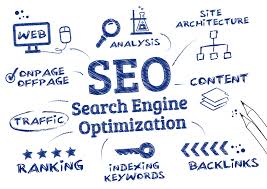
In the digital age, where online presence is paramount, Search Engine Optimization (SEO) has emerged as a crucial tool for businesses looking to enhance their visibility and reach a wider audience. SEO optimization involves a series of strategies and techniques aimed at improving a website’s ranking on search engine results pages (SERPs).
Effective SEO optimization encompasses various elements, including:
Implementing effective SEO optimization can yield numerous benefits for businesses, including:
In an ever-evolving digital landscape, staying ahead of the curve with SEO optimization is essential for businesses seeking sustainable growth. As search engines continue to refine their algorithms and user behaviours evolve, adapting your SEO strategies accordingly will be key to maintaining a competitive edge online.
Conducting thorough keyword research is a fundamental step in SEO optimization. By identifying and incorporating relevant terms into your content, you can effectively target the specific phrases that your audience is searching for. This strategic approach not only enhances the visibility of your website on search engine results pages but also ensures that your content resonates with users who are actively seeking information related to your products or services. Researching and utilising the right keywords can significantly improve the overall performance and ranking of your website, ultimately driving organic traffic and increasing engagement with your target audience.
To enhance your website’s search engine visibility, it is crucial to optimise your meta titles and descriptions by incorporating relevant keywords. Meta titles and descriptions serve as concise summaries of your web pages, displayed in search engine results. By strategically placing targeted keywords in these elements, you can improve the chances of your pages ranking higher for relevant searches. This practice not only helps search engines understand the content of your pages better but also entices users to click through to your site by providing them with a clear idea of what to expect.
Creating high-quality, engaging content that provides value to your target audience is a fundamental aspect of effective SEO optimization. By producing content that is informative, relevant, and engaging, you not only attract the attention of search engines but also establish credibility and trust with your audience. Valuable content not only helps improve your website’s visibility and ranking on search engine results pages but also encourages user engagement, increases dwell time, and ultimately drives conversions. Remember, content is king in the world of SEO, so investing in creating quality material that resonates with your audience is a strategic move towards digital success.
Improving website loading speed is a crucial tip in SEO optimization. A fast-loading website not only enhances user experience by reducing bounce rates and keeping visitors engaged but also plays a significant role in boosting SEO performance. Search engines like Google consider page speed as a ranking factor, so a quicker website can help improve your search engine rankings and visibility. By prioritising website loading speed, businesses can create a seamless online experience that benefits both users and search engines, ultimately leading to increased traffic and conversions.
Utilising internal linking is a valuable strategy in SEO optimization. By strategically linking pages within your website, you can establish a clear hierarchy and improve site navigation for both users and search engine crawlers. Internal links help distribute link equity throughout your site, directing traffic to important pages and enhancing the overall user experience. By creating a logical structure of interconnected pages, you can boost the discoverability of content and increase the authority of key pages, ultimately contributing to improved search engine rankings and visibility.
When implementing SEO optimization, it is crucial to optimise images by utilising descriptive filenames and alt text enriched with relevant keywords. By assigning meaningful filenames to images and incorporating keyword-rich alt text, businesses can enhance their website’s visibility on search engine results pages (SERPs) and improve the overall user experience. This practice not only helps search engines understand the content of the images but also contributes to boosting organic traffic and attracting potential customers who are actively searching for related products or services.
Regularly updating and refreshing your website content is a crucial aspect of SEO optimization. By consistently adding new and relevant content, you demonstrate to search engines that your site is active and engaging for users. This practice not only signals to search engine algorithms that your website is current and valuable but also encourages visitors to return for fresh information. Keeping your content up-to-date can improve your site’s visibility and ranking in search results, ultimately driving more organic traffic to your website.
To enhance your SEO strategy, it is vital to monitor and analyse your performance using tools such as Google Analytics. By utilising these tools, you can gain valuable insights into the effectiveness of your SEO efforts, track key metrics like website traffic, user behaviour, and conversion rates. This data allows you to make informed decisions, identify areas for improvement, and refine your SEO tactics to achieve optimal results in reaching your target audience and boosting your online visibility.